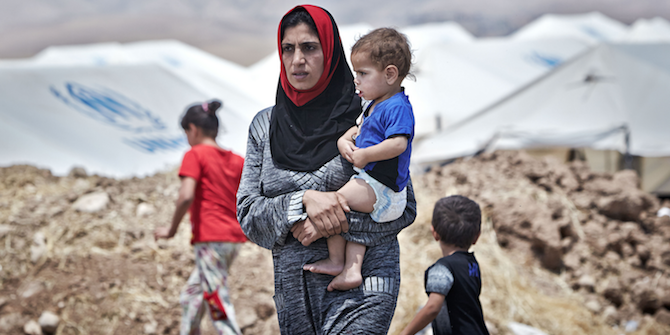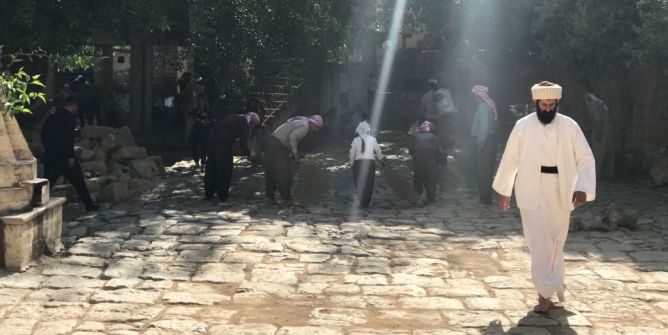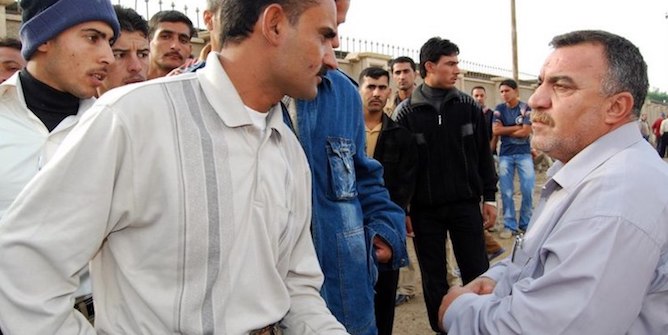This blog was originally published on the LSE Middle East Centre Blog. You can view the original post here.

The self-declared Islamic State (“IS”) has committed war crimes, crimes against humanity and genocide against Yazidis, Shi’i Turkmens, and Christians, among other minorities in Iraq. It is estimated that since 2014, IS kidnapped 6,800 Yazidi, 600 Shi’i Turkmen, and 220 Assyrian Christian women and girls, most of whom were forced into sexual slavery. The majority of abductees remain in captivity today. Those who have returned live in camps, where they struggle with stigma, and lack access to medical and psychosocial care and other basic services.
Upon return from captivity, state officials refer survivors to medical examination and psychosocial services, and also to legal authorities. Problems arise, however.
In the early days when women and girls fled IS captivity, “virginity tests” were reportedly forced upon survivors by medical examiners in order to document the fact that they lost their virginity through rape. Not only do these tests constitute sexual assault when forcibly conducted and involve vaginal penetration, they have “no scientific validity” according to the World Health Organization. The forceful application of this painful test, which is undoubtedly severely re-traumatizing for the survivors, was later reportedly stopped, in accordance with recommendations by the United Nations.
A major problem for survivors are the laws surrounding abortion. Under domestic laws, abortion is permitted to save the woman’s life, with two physicians’ approval and the husband’s written consent required. Abortion is not permitted for cases of rape. This causes survivors who become pregnant from rape to seek unsafe abortions, which carry risks for the women’s health and could also lead to criminal charges, as women, abortion providers and those who assist with abortions are liable under domestic laws.
For survivors who suffered rape by IS fighters and who wish to keep their children, domestic laws and practices present several challenges for processes such as obtaining documentation, especially if the women are not Muslim. Under Article 26 of the National Identity Card Law No. 3 of Iraq, dated 2016, a child shall be registered as Muslim if one of the parents is Muslim, regardless of whether the child was born of rape. The same provision also prohibits converting from Islam to other religions. This leaves non-Muslim mothers with two choices: either to register their children as Muslim, which disregards the mother’s faith and increases social stigma, or not register their children’s birth at all. The latter adds to the already high number of stateless children in Iraq, unable to access state benefits. Furthermore, as UNICEF Iraq Representative Peter Hawkins states, “…in practice obtaining such documents is exceptionally difficult and requires women to publicly expose what they have survived – experiences that their families, culture, tribe and religion consider to be deeply shameful.”
For some women, access to medical and psychosocial services was prevented by families or community members due to stigma surrounding sexual violence. This was the case for Shi’i Turkmen women, who, unlike Yazidi women, were not accepted back into their community. In some cases, Shi’i Turkmen women were rejected by their families and were asked to commit suicide by their family members. Articles 41 and 128 of the Iraqi Penal Code No. 111, dated 1969, which includes so-called “honor” motives as a mitigating factor in cases where women have been murdered, and sometimes is even used to exonerate the perpetrators, further endanger women who have survived sexual violence by IS.
The Joint Communiqué of the Republic of Iraq and the United Nations on Prevention and Response to Conflict-Related Sexual Violence, dated 23 September 2016, emphasizes the collaboration to ensure “the provision of services, livelihood support, and reparations for survivors and children born of rape.” Nonetheless, no comprehensive reparation program (administrative or as a result of legal proceedings) has been implemented in Iraq or the Kurdistan Region for survivors of sexual violence post-IS. The Basic Principles and Guidelines on the Right to a Remedy and Reparation for Victims of Gross Violations of International Human Rights Law and Serious Violations of International Humanitarian Law provides that victims of “gross violations of international human rights law or serious violations of international humanitarian law” shall be provided with “adequate, effective, and prompt reparation”. The state shall provide reparation to victims for acts or omissions that can be attributed to the state, and should also try to establish large-scale reparation programs if “the parties liable for the harm suffered are unable or unwilling to meet their obligations.”
This study will investigate how, post-liberation, Iraqi and Kurdish officials responded to survivors of conflict-related sexual violence by IS to identify necessary amendments to domestic practices and laws that would ensure the interests and rights of survivors are protected. It will also examine the needs of survivors in order to draft a framework of administrative reparation schemes for survivors in light of key documents such as the Guidance Note of the Secretary General on Reparations for Conflict-Related Sexual Violence and the Nairobi Declaration on Women’s and Girls’ Right to a Remedy and Reparation. The policy recommendations delivered as a result of this research will hopefully inform Iraqi and Kurdish policy makers, in addition to non-governmental organizations handling cases of conflict-related sexual violence and international development agencies and initiatives.
This research comes at a critical time, as the Investigative Team established by the United Nations Security Council Resolution No. 2379, dated 21 September 2017 has now started its mission in Iraq to collect, preserve, and store evidence of acts that may amount to war crimes, crimes against humanity and genocide committed by IS. According to the Terms of Reference, dated 9 February 2018, the Special Adviser heading the Team will also “promote throughout the world accountability for acts that may amount to war crimes, crimes against humanity and genocide committed by ISIL (Da’esh) and work with survivors, in a manner consistent with relevant national laws, to ensure that their interests in achieving accountability for ISIL (Da’esh) are fully recognized.”
Elevating survivors’ voices and needs is essential to achieving peace in Iraq post-IS. This study will hopefully contribute to that goal.
This blogpost introduces the LSE research project Reforming Legal Responses to Conflict-Related Sexual Violence in Iraq and the Kurdistan Region by Güley Bor, examining how laws in Iraq could be reformed to provide better response to female survivors of conflict-related sexual violence. This project forms part of the Conflict Research Small Grants Programme, funded by the UK Department for International Development to provide research and policy advice on how the risk and impact of violent conflict might be more effectively reduced through development and governance interventions.
Note: The CRP blogs gives the views of the author, not the position of the Conflict Research Programme, the London School of Economics and Political Science, or the UK Government.



